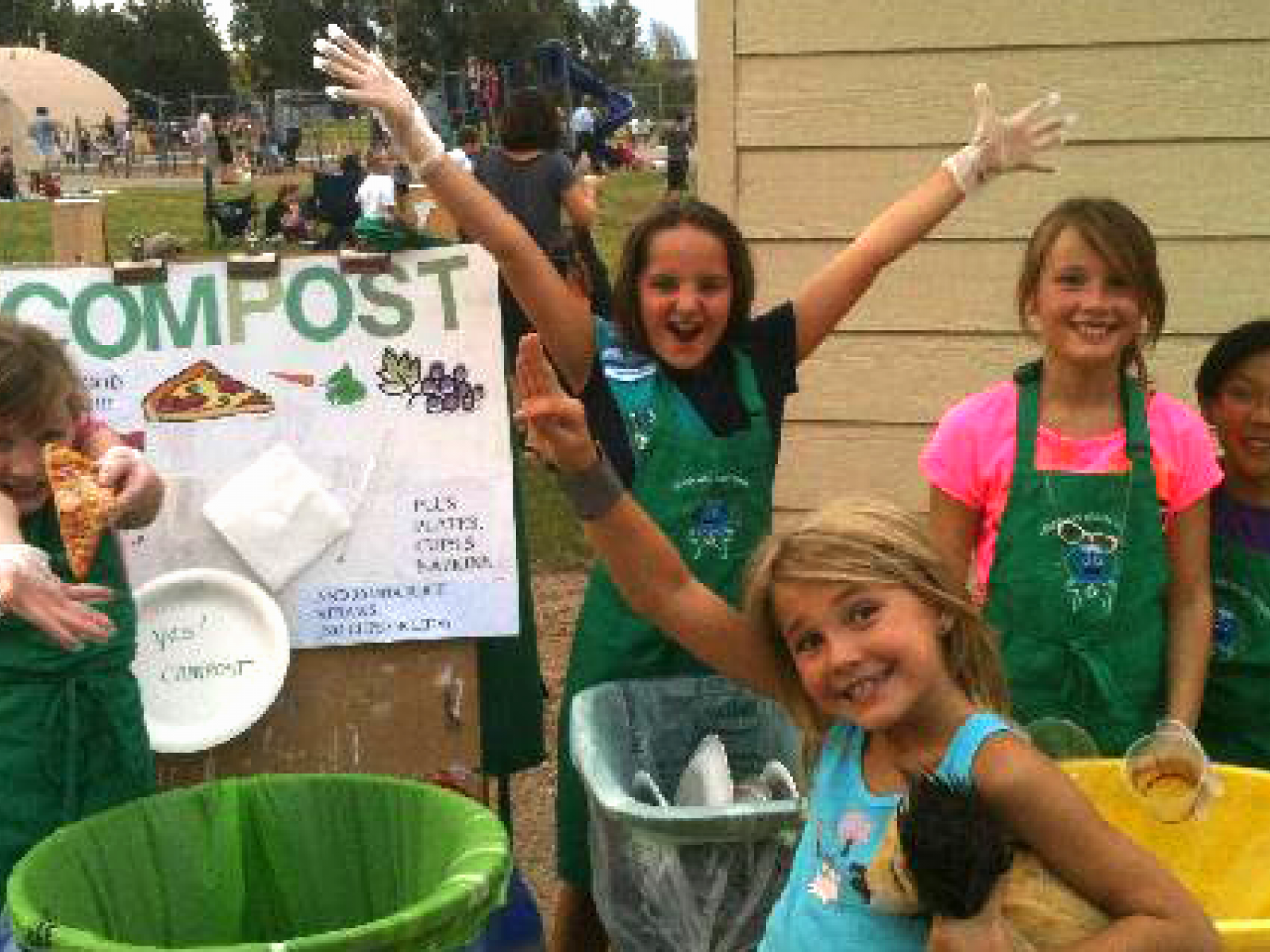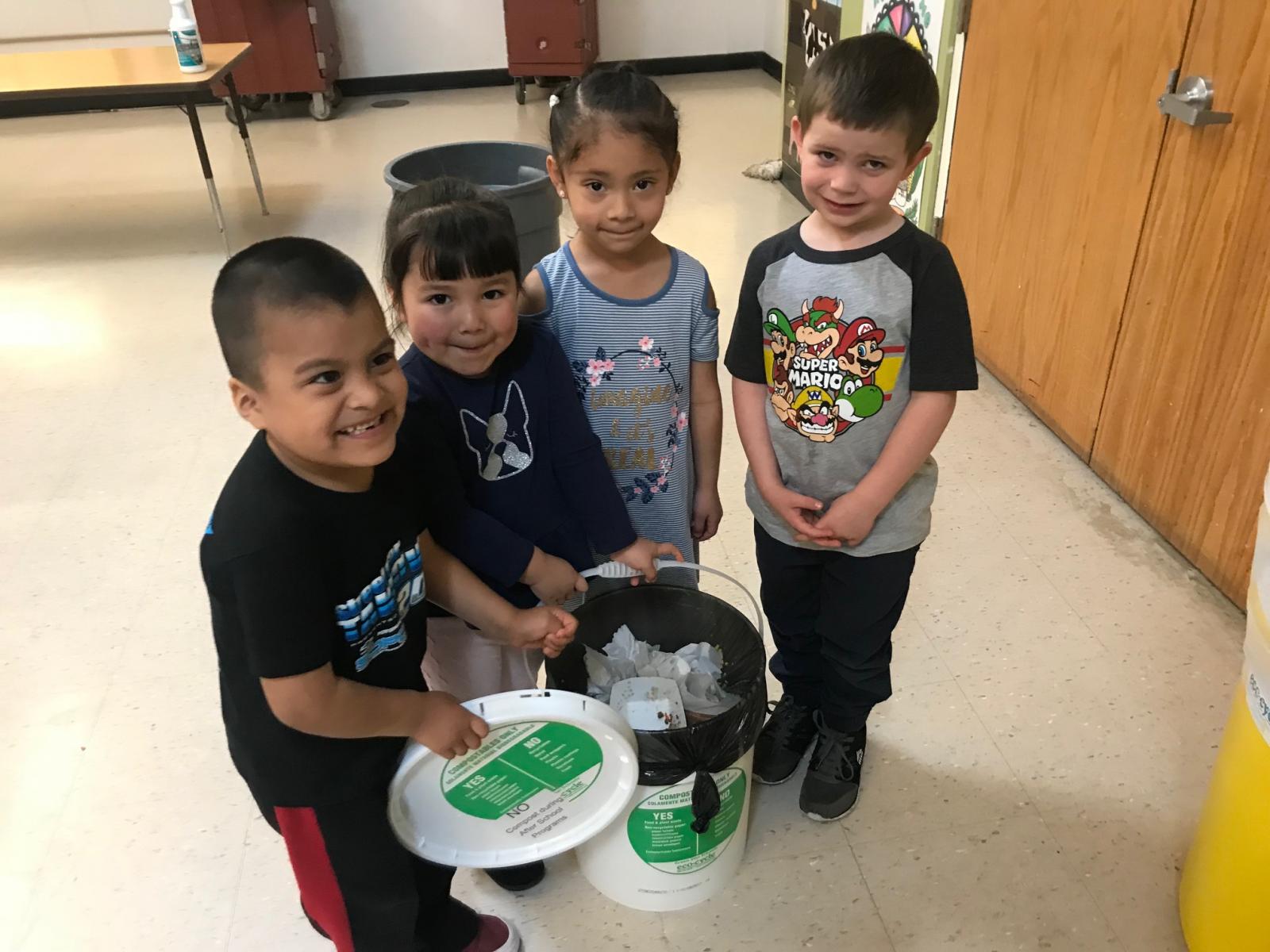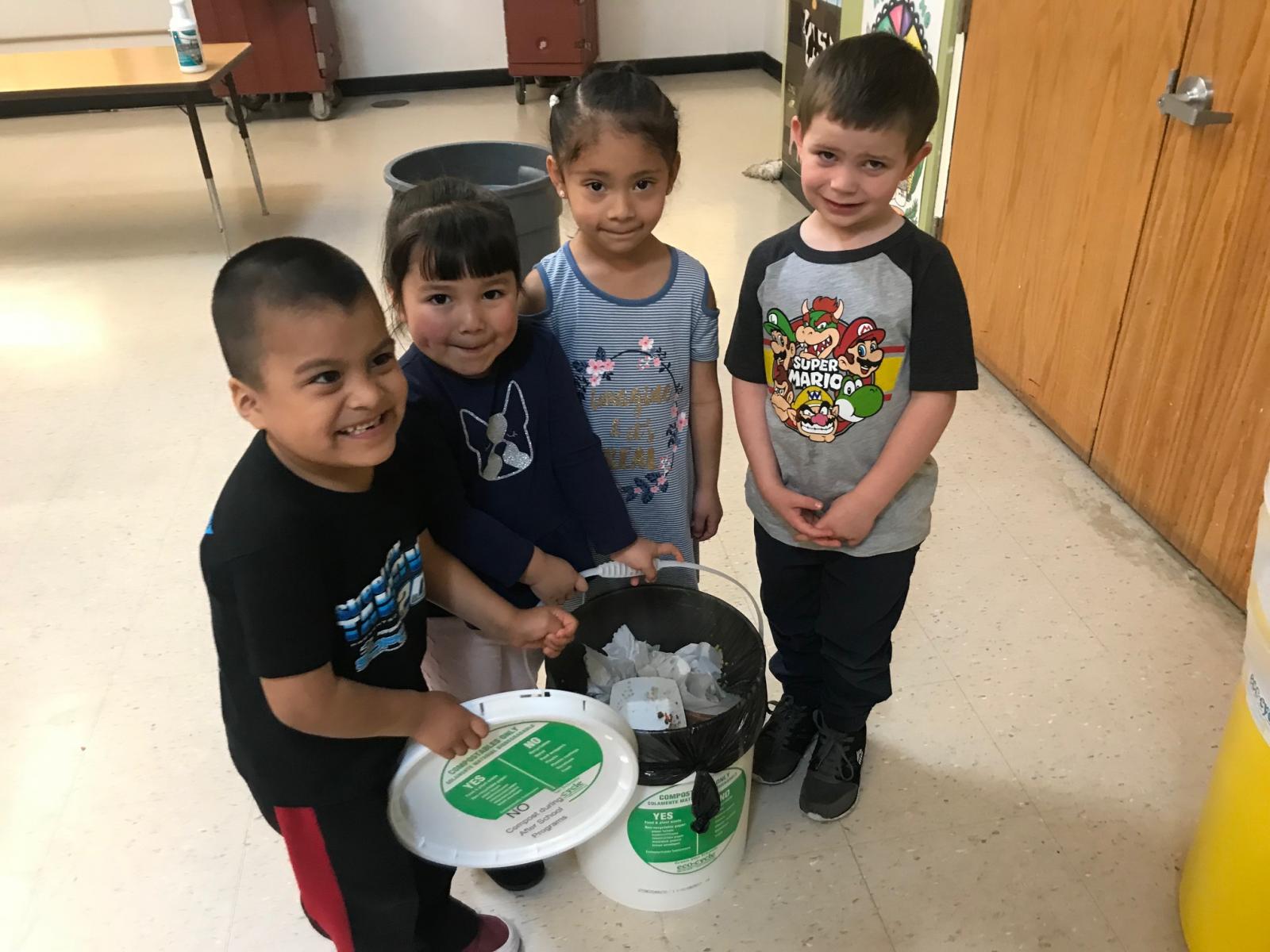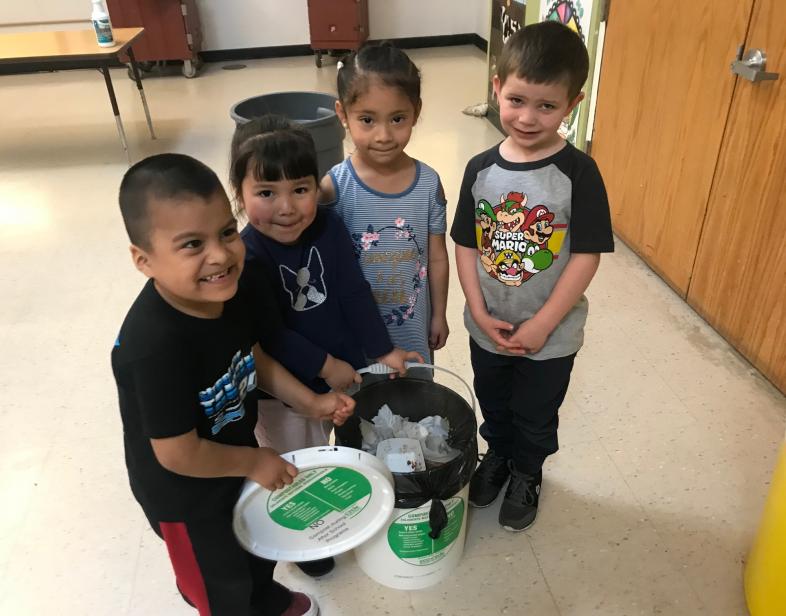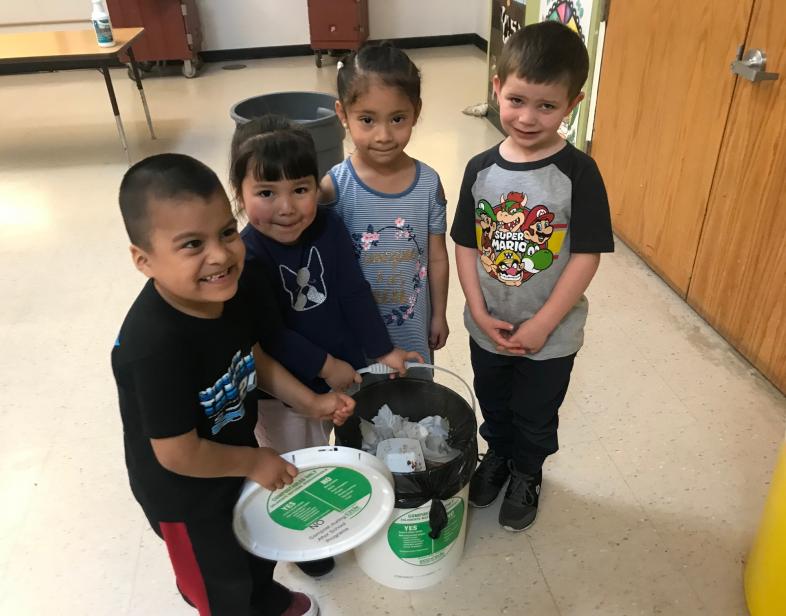An Overview Of Our Solution
The way we produce, consume, and dispose of our products and our food in this wasteful, linear economy accounts for 42% of all U.S. greenhouse gas emissions. A rapidly changing climate will fundamentally affect the life of every global citizen and species including water and food supplies, health, viability, and more.
It’s obvious we need to make a big cultural shift. At Eco-Cycle, we believe that individual and community action can transform society’s throw-away ethic into environmentally-responsible stewardship. Our award-winning Green Star Schools program in Boulder County, CO engages students and staff in Zero Waste practices, such as waste reduction, reuse, recycling and composting. We request support to make the Green Star Schools program into a Zero Waste Schools guide that will allow public schools nationwide launch their own Zero Waste programs.
- Population Impacted: Public school students, nationwide
- Continent: North America
Context Analysis
Currently, our production system goes one way — from the earth to the dump. We extract natural resources like trees, precious metals, and petroleum. We manufacture them, often through polluting, toxic, and wasteful practices, into products designed primarily for convenience. We distribute them to communities, often shipping them long distances. After we all buy and use these products, we pitch them into a landfill or burn them in an incinerator, both of which destroy the value of those resources. When we need new products, we just head back to the natural resources like there is an infinite supply.
The way we produce, consume, and dispose of our products and our food in this wasteful, linear economy accounts for 42% of all U.S. greenhouse gas emissions. A rapidly changing climate will fundamentally affect the life of every global citizen and species including water and food supplies, health, viability, and more.
Describe the technical solution you wanted the target audience to adopt
Eco-Cycle’s mission is to identify, explore and demonstrate the emerging frontiers of sustainable resource management and climate change solutions through the concepts and practices of Zero Waste— reducing, reusing, recycling and composting. These practices significantly reduces our impact on the planet by decreasing resource and energy consumption, air and water pollution, and methane generated by landfills, all of which helps combat climate change.
A Zero Waste system is cyclical, as in nature, and aligns with a circular economy. In a circular economy, we reduce our use of finite resources and allow used resources to re-enter the production process through reuse, recycling, and composting. Moving towards a circular economy means a big cultural shift, but we’re already seeing progress as schools, businesses, and communities strive for Zero Waste through increased recycling, composting, and waste-reduction initiatives.
Type of intervention
Describe your behavioral intervention
We believe that individual and community action can transform society’s throw-away ethic into environmentally-responsible stewardship. Eco-Cycle’s award-winning Green Star Schools program engages students and staff in Zero Waste practices, such as waste reduction, reuse, recycling and composting. We respectfully request $25,000 to complete our work to make the Green Star Schools program into a Zero Waste Schools guide that will allow public schools nationwide launch their own Zero Waste programs.
The Zero Waste Schools guide includes activities that promote Zero Waste practices within a context of environmental stewardship. These activities can be used by schools, but also by after-school programs, churches, libraries, etc. The guide also includes a blueprint for launching a Zero Waste program at school and addresses the logistical, funding, and engagement issues necessary for a successful program.
We will help schools nationwide recycle and compost 66% of their discards instead of sending them to the landfill, which is almost double the national average for diversion. We will accomplish this by teaching youth and their families to live more sustainably by addressing the issues of resource depletion, habitat destruction and climate change, and empowering to them to take action and become stewards of the Earth, as Kim’s story below demonstrates.
As needed, please explain the type of intervention in more detail
“It really started for me in the third grade. My elementary school was a Green Star School, which opened my mind to how we, even as kids, could save natural resources” says Kimberly Fung, a high school senior in Longmont, CO. From that spark of curiosity as a child, Kim is now helping bring solar panels to three Boulder County schools, and also founded The Green Initiative, a campaign in Longmont working to increase the community’s compost rate.
Kim is exceptional, but not the exception –the Green Star Schools program educates youth in environmental issues and empowers them to be good stewards of the Earth. There is no better way to change our society’s culture of wasteful habits than by educating and engaging children.
Describe your implementation
Our goal is to complete a Zero Waste Schools guide, based on our successful Green Star Schools program, that will help move schools nationwide as close as possible to Zero Waste by initiating compost collections, increasing the volume of recyclables collected and encouraging waste reduction through a number of innovative projects. The main activities of the program, and tenets that would be provided in our guide, include:
1. Targeting the collection of recyclables and compostables from entire school waste streams, including lunchrooms, kitchens, classrooms, offices and restrooms;
2. Emphasizing waste reduction. One major challenge is helping kids understand that they have power to reduce their own environmental impact. To overcome that challenge, we educate about waste reduction so that students and staff learn how to make better choices about what they consume and understand the power of their decisions.
3. Ensuring students maintain Zero Waste habits as they mature into adulthood. We strive to provide Zero Waste education from pre-K through 12th grade, giving students the ability to practice Zero Waste and form lifelong habits throughout their academic career.
4. Integrating environmental education with school curriculum and putting STEM principals into action through education on resource conservation, the environmental benefits of the 3 R’s, the biology of the composting process, and forest ecology. The high quality of our curriculum, and its alignment with academic standards, is why we have such enthusiastic buy-in from administrators and teachers of all our Green Star Schools.
5. Creating a blueprint for schools to launch a comprehensive Zero Waste program that addresses the concerns we have helped overcome over decades from teachers, administrators, janitorial and cafeteria staff. For example, the guide includes topics such as funding, gaining staff support, setting up bins, training for staff, and creating student-led green teams.
External connections
The Green Star Schools program builds on Eco-Cycle’s successful “School Recycling and Environmental Education” program, which has helped schools meet state standards with environmental education since 1987. Through experiential and classroom education, our interdisciplinary curriculum addresses state standards in science and social studies. In addition to Eco-Cycle providing environmental education on topics like air quality/pollution, forest and soil ecology, and water and energy conservation.
Our partners include the school districts in our geographic locale: Boulder Valley School District and St. Vrain Valley School District. We also consider each of the 50 schools, including their administrative, teaching, cafeteria, and janitorial staff our partners because each plays a vital role in integrating Zero Waste into the school day. Finally, the support of our major funders, including the Ball Foundation, Western Digital, Patagonia and New Belgium Brewing make this program possible.
Who adopted the desired behaviors and to what degree?
Fifty schools in Boulder County are Green Star Schools and have adopted our strategies to reduce, reuse, recycle, and compost (all public schools in the area are on waitlist). These schools comprise 21,124 students and 2,485 staff, and are diverting 66% of their “waste” from landfills by recycling and composting.
Many schools are also participating in special projects that fit their school’s unique Zero Waste culture. Several schools hosted a “Classroom Cleanout”—an exchange table at the end of the school year where teachers and students donate or select items for reuse. A middle/high school worked with Eco-Cycle to develop a paid internship program for students to promote Zero Waste in their school and community by staffing Zero Waste events, surveying other students, conducting waste audits for businesses and homes, and participating in planning groups. We encourage schools to participate in the many projects we have developed for them, and encourage then to develop their own!
How did you impact natural resource use and greenhouse gas emissions?
Approximately 215 tons of compostables and 155 tons of recyclables were diverted from the landfill by Green Star Schools during the 2017-2018 school year. According to the Environmental Protection Agency’s Waste Reduction Model, which tracks report greenhouse gas emissions reductions from several different waste management practices. According to the model, for every one ton of recycling or composting collected, 3 tons of carbon emissions are saved. Overall, the Green Star Schools program helped 50 schools attain 1,110 tons of carbon emissions savings, equivalent to the total energy use of almost 120 homes for a year.
In addition, the tons composted prevented the release of methane—a dangerous greenhouse gas that is 84 times more potent than carbon in the short-term. Methane is released when organic matter, such as yard trimmings and food scraps, are sent to landfills, where they decompose without oxygen. When composted correctly, organic matter does not release methane.
What were some of the resulting co-benefits?
The Green Star Schools Program promotes environmental stewardship to students, but the message is spread to their families. For example, this comment from a parent:
“Thanks to the Green Star Schools program, my daughter comes home from school and digs through our trash to point out what could be recycled or composted rather than thrown away…widespread change truly begins with children.”
Another co-benefit is resiliency. You may have heard that China effectively stopped importing American recyclables in January 2018, causing devastation to the recycling market. In some communities, materials are collected with no place to ship them. Some communities are halting recycling pick-up, and others are forced to send recyclables to landfill. Eco-Cycle’s education programs--including the Green Star Schools Program--contributes to a well-informed community, which helps produce very clean recyclables. Because of this, Boulder County’s recyclables are making it to market—not to landfills.
Sustainability
Currently, the Green Star Schools program is free to schools. We are funded by contracts with the school districts with which we work, and by grants from private foundations and corporations. We request $25,000 to complete our Zero Waste Schools guide, which compiles our decades of experience to help other teachers and administrators develop Zero Waste programs at their schools.
Once the Zero Waste Schools guide is complete, it will be available for free to teachers, schools, and other interested organizations to access. In the future, we may develop accompanying materials and technology to support and enhance the material in the guide for a charge, but all schools, regardless of funding, will have access to the guide.
Return on investment
To complete the Zero Waste Schools guide that would be accessible to any school after completion, we divide the total budget of $40,000. At this point, we do not foresee charging for access to the guide.
How could we successfully replicate this solution elsewhere?
There is no comprehensive Zero Waste Schools guide currently available. To fill this void, Eco-Cycle has been developing our Zero Waste Schools guide, which takes the lessons we have learned over decades of operating our successful program to benefit schools nationwide.
Our guide includes a blue print to help launch a Zero Waste program at schools with very different demographics, populations, funding systems, and locations. We also include the most successful lessons and activities, which have been refined over the years. And, above all, our Zero Waste Schools guide provides flexible design so that teachers can use these activities in all subject areas and grade levels.
Our budget to complete the guide is $40,000, which includes text review and design layout. Initial distribution would occur through the Eco-Cycle Hub, our department that consults with local governments around the nation to help meet their Zero Waste and sustainability goals.
